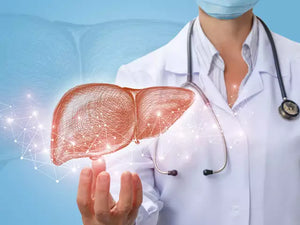Approximately 4.5 million Americans will get diagnosed with liver disease, and there is an estimated 80-100 million adults that have some form of fatty liver. The statistics are staggering, and growing at a worrisome rate, but it doesn't mean that we're helpless!
If you hop onto Google and just type "What causes liver disease" you'll find a list of things ranging from heavy alcohol abuse, obesity, type 2 diabetes, drugs, blood transfusions before 1992, unprotected sex, even tattoos and piercings, but none mention about nutrient deficiencies...
Well did you know that magnesium deficiency is directly correlated to liver disease? Let's get into it.
Magnesium is a vital mineral that is required for helping make ATP within the cell (cellular energy), helps with DNA replication and repair, metabolic functions, cell proliferation, ion transpiration and more. In fact, there are over 800 enzymatic reactions dependent solely on magnesium making it one of the, if not the most, important mineral in the body.
Regarding the liver however, just like magnesium, holds many different hats. Our livers are important for blood sugar regulation, detoxing, producing bile, synthesizing nutrients, transforming thyroid hormone, as well as the transportation and distribution of many trace elements, including magnesium. Interestingly enough, many individuals with liver disease also suffer with magnesium deficiency, which has been correlated to the birthing of the disease. Studies have shown that for every 100mg increase in magnesium intake there is a 49% decrease in the risk of mortality due to all liver diseases. You can find that study here.
So how has magnesium been shown to help with liver disease exactly?
Well, magnesium is actually a mineral that works particularly during Phase 2 detoxification within the liver. For a little run down, the liver has 3 detoxification phases. Phase 1, 2 and 3.
- Phase 1 is when the liver transforms toxins and fat soluble components like bacterial endotoxins, hormones, drugs, food additives, chemicals, pollutants, microbes, etc., into less harmful particles so they can make it to the second phase of detoxification.
- Phase 2 is considered the conjugated phase, meaning these fat soluble particles are then transformed into water soluble so it can be easier for the body to rid of.
- Phase 3 happens outside of the liver, but is connected to how well the liver was able to process everything and is the act of the waste removal through either urine or bile.

Now what's interesting is that there have been studies showing cirrhosis, also known as fatty liver disease, characterized by a magnesium deficiency. Is there a definitive reason for this? Not quite. Some studies such as this one here figure many people with cirrhosis also have a history of chronic alcohol use. This shouldn't come as a surprise considering how alcohol is not just a carcinogen but also a stressor on the body, and when we are under any type of stress, one of the first minerals the body starts to use up is magnesium. Conversely, alcohol is dehydrating, and magnesium is one of our main electrolytes, hence increase urine output.
Another point that should be made is that the presence of magnesium deficiency aggravates liver disease, even if it's not caused by a lack of magnesium in the first place. When the magnesium within liver cells is low, leukocytes and macrophages are stimulated and start releasing inflammatory cytokines, recruiting more inflammatory cells to the liver. This inflammatory response causes damage to liver cells and as the body tries to repair itself fibrosis occurs, which aggravates liver cirrhosis.

In addition, there have also been correlations to magnesium and liver cancer. Magnesium is an enzyme cofactor for a series of enzymatic reactions, and many of them being involved in DNA repair. This means magnesium is critical in the modulation of a cell cycle progression, cell proliferation, differentiation, and apoptosis. Without it, dysfunction of these systems could arise and lead to DNA mutations, which could result in tumorigenesis, and liver cancer.
All in all, magnesium seems to play a pivotal role in maintaining a healthy liver because of its many uses and role in liver function. If you are thinking you might have magnesium deficiency and would like to try our Upgraded Magnesium, go ahead here to order. If you're looking to test first before ordering, check out our HTMA kits here and get an evaluation from one of our nutritionists on staff too to get personalized recommendations!
Barbara Madimenos
Hair Tissue Mineral Analysis Practitioner
Functional Diagnostic Nutrition Practitioner
Integrative Health Coach


